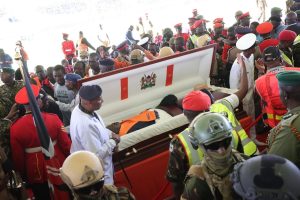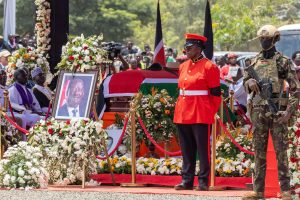Politics
The King Is Dead, Long Live the Crown: Winnie Odinga Steps Into Her Father’s Shoes
But what Winnie seems to carry is something different. It is not the dynasty in its old form, not the ancestral claim to opposition politics, but the Raila brand itself. Baba.
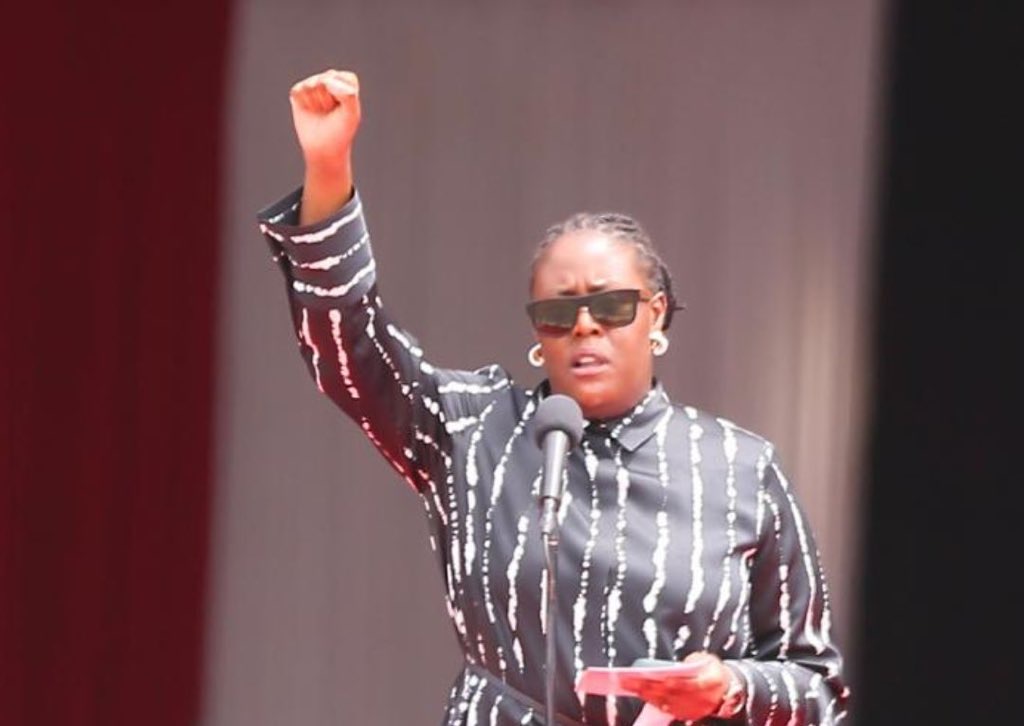
The sun hung low over Nyayo National Stadium on that Friday afternoon in October, casting long shadows across the mourners who had gathered to bid farewell to Raila Amolo Odinga.
Inside the packed arena, thousands sat in collective grief, their eyes fixed on the podium where the Odinga family would speak. When Winnie Odinga rose to address the nation, something shifted in the air. This was no longer just a funeral. It had become a political baptism.
“The king is dead,” she declared, her voice steady and clear, cutting through the heavy silence. “But long live the crown.”
The words landed like thunder. In that single phrase, Winnie Odinga transformed from a daughter mourning her father into a political figure claiming space in a landscape suddenly emptied of its most commanding presence.
She listed his names, the names that had become legend: Tinga, Jakom, Nyundo, Baba. Each one carried the weight of five decades of struggle, defiance, hope, and heartbreak. She mimicked his laugh, that infectious sound that had echoed through rally after rally, and spoke of service over power, of legacy over ambition.
Then she began to sing. Harry Belafonte’s Jamaica Farewell, one of Raila’s favorites, rose from her throat, and the crowd, thousands strong, followed. “Down the way, where the nights are gay,” they sang together, voices merging into something that felt less like a dirge and more like a promise. When Winnie changed the line to “I have to leave a little girl in Bondo town,” the stadium understood. The little girl was both memory and mantle, both past and future.
In the days since her father’s sudden death from cardiac arrest in India, Winnie had become the face the nation could not look away from. At Jomo Kenyatta International Airport, when the body arrived, she stood firm and unsmiling, clutching Raila’s iconic hat, that battered piece of fabric that had become as much a symbol of resistance as the man who wore it.
The cameras captured her handing it to her mother, Ida Odinga, in a gesture that transcended grief. She was not merely a mourning daughter. She had become a political symbol in real time.
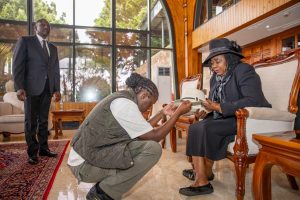
Youngest daughter to the late former Prime Minister Raila Odinga, Winnie Odinga, hands her father’s white fedora hat to her mother, Mama Ida Odinga, inside the VVIP offices at the Jomo Kenyatta International Airport.
The Odinga name has cast its shadow over Kenyan politics for more than half a century, beginning with Jaramogi Oginga Odinga’s principled defiance of the Kenyatta regime, continuing through Raila’s own decades-long battle against the establishment.
But what Winnie seems to carry is something different.
It is not the dynasty in its old form, not the ancestral claim to opposition politics, but the Raila brand itself. Baba.
The street chants, the songs, the hat, the cadence of a man who built a political identity that existed somewhere between myth and memory.
She grew up fluent in that language. While many political heirs arrive swaddled in history but untested by its storms, Winnie has been in the crowd, not just above it.
During the Azimio la Umoja protests in Nairobi, she wore jungle pants, a half jacket, and boots, and marched. When her phones were hacked, she did not retreat behind press officers or carefully worded statements. She posted on social media: “All electronics hacked! All completely unusable, all dead! Meet me in the streets.”
It was not scripted.
It was raw, the kind of raw that makes a crowd believe you are one of them. When police targeted her car during those protests, Raila himself condemned it, his outrage both paternal and political, drawing a line between a father’s daughter and a movement’s heir. That line, however carefully drawn, has now been erased by death.
Winnie had entered formal politics in November 2022, when she was nominated to the East African Legislative Assembly by the Orange Democratic Movement. At the time, it seemed like the kind of quiet nepotism that Kenyan politics has perfected, a famous last name opening a door that might otherwise remain closed.
But death has a way of rearranging narratives.
In the days after Raila’s passing, Winnie stopped being a footnote in the dynasty and became its most vivid paragraph.
The ODM party named Oburu Odinga, Raila’s older brother, as party leader, a gesture toward continuity and respect for the family hierarchy. But the crowd, the real, sweating, chanting crowd that made Raila who he was, did not chant “Oburu.” They chanted “Baba.” And in the absence of Baba, their eyes turned to the person holding his hat.
This is the strange and potent nature of the Raila brand. It is not bureaucratic. It is not even institutional. It is emotional. It lives in symbols and stories, in the call and response of rallies, in the collective memory of a man who seemed indestructible until he was not.
Winnie, perhaps more instinctively than strategically, has leaned into that emotional current. She does not speak as the heir to an Odinga throne. She stands as the keeper of Raila’s language, the songs, the jokes, the sharp quips, the moral cadence of service before power.
And in Kenyan politics, that kind of symbolism is often more powerful than a title.
On Sunday, at the final funeral service at Jaramogi Oginga Odinga University of Science and Technology in Siaya, Winnie spoke briefly but with purpose. She thanked President William Ruto for honoring her father, for standing with the family during their bereavement.
Then she turned to face the President directly, making it clear the message was for him. “Your Excellency, our people appreciate you honoring our father. Thank you for standing with us. You should also know, in case you are wondering, I’m ready to come back home.”
The words hung in the air.
President Ruto, seated next to Mama Ida Odinga, exchanged glances with those around him, bending slightly and smiling in response. The gesture was small, but the implications were enormous.
Winnie was signaling her intention to return to local politics, to leave the regional legislative assembly and plant her feet firmly on Kenyan soil, in Kenyan constituencies, in the heart of the political struggle her father had waged for so long.
But symbolism is not strategy, and Winnie faces the jagged reality that comes after the chants die down.
The ODM party is thick with veterans who have waited decades in Raila’s shadow. Governors, senators, members of parliament, men and women with their own ambitions and their own claims to leadership. They will not yield easily to a woman in her thirties whose political resume consists of a nomination and a famous last name.
If she wants to lead, she will have to earn it in the blood sport of Kenyan elections. The Raila brand can open the gate, but it cannot walk her through it.
Still, she is uniquely positioned.
Kenya’s youth, restless, disillusioned, and weary of the same faces recycling through power, see in her something they do not see in the party elders. Not polish, not policy, but familiarity. A kind of proximity to power that does not feel alien.
When she speaks, they do not hear a politician reaching down from a podium. They hear someone raised in the protest tent, someone who learned politics not from books but from the front row of rallies.
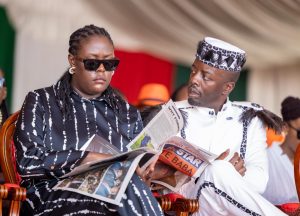
Winnie Odinga and her brother Raila Odinga Jnr during their father’s funeral service at the Jaramogi Oginga Odinga University of Science and Technology, October 19, 2025. /PCS
And she has something else: timing. Kenya’s opposition has been left with a vacuum that no one else can fill. Raila’s shadow was too long, his myth too thick.
President Ruto governs, but Raila’s absence defines the opposition space more than anyone else’s presence. Winnie does not have to build a movement from scratch. She only has to keep it from crumbling.
Her strategy may not follow the predictable script. She could seek an elective seat, a parliamentary constituency in Nyanza perhaps, to build legitimacy. Or she could stay where she is, neither fully in power nor out of it, becoming something less tangible but more dangerous to the establishment: a lodestar. The person who can summon crowds with a phrase, who can keep Baba alive not as a statue but as a story.
The Raila brand has always belonged to the people more than to the party. It is not a lineage. It is a rhythm. Not “Odinga,” which belongs to history, to family, but “Raila,” the name the crowds chant. Winnie understands this distinction, whether she says it out loud or not. She does not need the family name to move people. She only needs the hat, the song, the voice that carries a memory they all recognize.
This is both her opportunity and her peril. If she inherits Raila’s hat, she inherits too his enemies. In Kenya, power does not tolerate heirs lightly, and Raila knew that quite well.
He had to fight to make his brand outside the Jaramogi factor, to step out from his father’s shadow and build something that was his alone. Winnie will have to do the same.
She will have to prove that she is not simply riding her father’s coattails, but carrying forward something real, something earned.
In the end, Winnie Odinga may or may not want to lead. But leadership has a way of finding those who carry symbols. She carries Raila’s hat. The crowd still chants “Baba.” And somewhere in the hush between mourning and ambition, a young woman is learning to wear a legacy not like a crown, but like a second skin.
At the funeral in Bondo, as her father was laid to rest beside his father Jaramogi in the family graveyard at Kang’o Kajaramogi, Winnie chose to say little. She thanked Jakom’s staff, thanked the leaders and citizens who had supported the family, and promised to return later to express her gratitude personally. Then she raised her fist and repeated the phrase that has already begun to define her: “The king is dead, but long live the crown.”
The crowd roared. Whether she meant it as a vow or simply as a tribute, whether she was claiming the mantle or simply honoring the man, no one can yet say. But the moment has been marked. The hat has been carried. And in Kenyan politics, moments like these do not fade quietly into history. They become the seeds of what comes next.
Now the question is not whether Winnie Odinga will throw the hat into the ring, but when. And when she does, the country will be watching.
Kenya Insights allows guest blogging, if you want to be published on Kenya’s most authoritative and accurate blog, have an expose, news TIPS, story angles, human interest stories, drop us an email on [email protected] or via Telegram
-

 Business4 days ago
Business4 days agoCooking Fuel Firm Koko Collapses After Govt Blocks Sh23bn Carbon Deal
-

 Business3 days ago
Business3 days agoABSA BANK IN CRISIS: How Internal Rot and Client Betrayals Have Exposed Kenya’s Banking Giant
-

 Politics2 weeks ago
Politics2 weeks agoYour Excellency! How Ida’s New Job Title From Ruto’s Envoy Job Is Likely to Impact Luo Politics Post Raila
-

 Business2 weeks ago
Business2 weeks agoMinnesota Fraud, Rice Saga, Medical Equipment Deal: Why BBS Mall Owner Abdiweli Hassan is Becoming The Face of Controversial Somali Businessman in Nairobi
-

 Americas3 days ago
Americas3 days agoEpstein Files: Bill Clinton and George Bush Accused Of Raping A Boy In A Yacht Of ‘Ritualistic Sacrifice’
-

 News2 weeks ago
News2 weeks agoKenya Stares At Health Catastrophe As US Abandons WHO, Threatens Billions In Disease Fighting Programmes
-
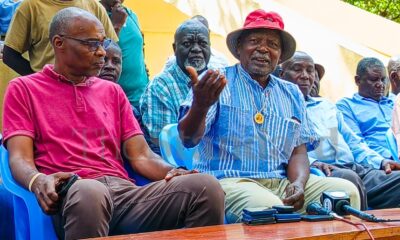
 Politics2 weeks ago
Politics2 weeks agoJaramogi Clan Tells Raila Jr, Winnie Against Disrespecting Their Uncle Oburu, Warns of Curses
-

 News2 weeks ago
News2 weeks agoDCI Probes Meridian Equator Hospital After Botched Procedure That Killed a Lawyer

